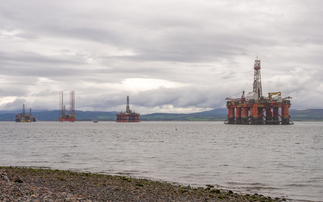The UK is either on the cusp of a credibly Green Brexit, a rejection of Brexit altogether, or a 'no deal' disaster for the environment
It couldn't actually happen, could it? After detailed warnings from government that a 'no deal' Brexit would be disastrous for everything from energy security to critical medical supply chains. After the credible projections showing how crashing out of the EU would result in deep and sustained economic damage. After the repeated protestations from Parliament and cabinet ministers that there is no majority, still less a mandate, for 'no deal'. Could we really tumble out of the EU without any form of withdrawal agreement, triggering a self-imposed recession and political chaos in the process? The answer is 'yes, and unless something fundamental changes in Westminster in the coming weeks that is precisely what will happen'.
Last night's humiliating defeat for the government's Brexit plan increased the likelihood of both a 'no deal' scenario and either a softer Brexit path or even a second referendum. Theresa May's typically narrow interpretation of self-interest, which this morning rapidly turned a seemingly mature pledge to finally seek some form of cross-party consensus into a nakedly partisan and self-defeating reiteration of her negotiating red lines, further amplified the chances of disaster.
Remarkably, the government looks set to narrowly defeat Jeremy Corbyn's no confidence vote tonight on the grounds that the only people in the country who still have confidence in the government are many of the same people who just heaped ignominious defeat upon it. Theresa May's plan then appears to amount to making some cosmetic changes to the roundly rejected deal and trying again. All the while, the clock ticks down. The Prime Minister is heading towards the corner flag with three minutes to go - the problem is her team are six-nil down.
Make no mistake, a 'no deal' Brexit would be supremely challenging for the green economy. Friends of the Earth's Craig Bennett this morning described it as "catastrophic for the environment". Greener UK's Amy Mount said it would have "disastrous consequences". Pretty much every green business trade body going has publicly warned against such an outcome.
Are these warnings 'project fear' hyperbole or are they credible? It depends on your definition of "catastrophic", but there is no doubt the risks are very real. The macro trends that have driven the development of the green economy this past decade - keeping global clean energy investment above $300bn a year for the fifth year in succession, according to BloombergNEF's new report today - will remain in place whatever happens at the end of March. The UK will still need clean and secure energy supplies, the urgent need to tackle air and water pollution will remain in place, the desire to compete in the clean industries of tomorrow will be no less pronounced, and the Climate Change Act and other critical environmental protections will remain in place.
However, there is no doubt that a 'no deal' Brexit would unleash an avalanche of direct and indirect challenges for the green economy and the UK's environment. Under the government's own plans, large parts of Kent would be turned into a lorry park, diesel generators would be sent to Northern Ireland, and policies and rules governing emissions trading, cross-border energy trading, waste trading, and a hell of a lot more besides would descend into costly chaos and confusion. And those are just the ultimately manageable short term impacts.
Critical plans to pursue a net zero emission target, decarbonise road transport, and overhaul waste and resource policy would all be pushed onto the backburner as the government battles to tackle the immediate economic fallout of 'no deal'. Recession and falling tax takes would inevitably starve critical clean tech industries and projects of attention and funding. Calls to slash environmental regulations, cut taxes, green light dirty infrastructure projects, and ink a chlorinated chicken trade deal with the US would reach a crescendo.
Depressingly, the rational thing for green businesses to do at this point is to think seriously about how to manage the fallout from 'no deal'. Larger businesses will have been working on no deal contingency plans for months. Now smaller businesses without the resources to develop comprehensive new strategies will have to think seriously about how they would respond to a self-imposed economic crash. Whatever happens, the first quarter economic data is going to be revelatory. On the back of a disappointing Christmas for retail it now seems all but inevitable that our political class will have triggered several more months of deferred investment decisions and hiring freezes. Well done everyone.
Are there any causes for optimism amidst this bleak outlook, beyond the evergreen argument that the long term fundamentals driving green investment and sustainable business strategies remain robust?
Thankfully, there are still some causes for optimism amidst the smouldering wreckage that is Britain's reputation for good governance. There is no mandate nor majority for 'no deal'. No one voted for dirtier rivers and beaches, nor for the reinvention of the UK as a tax haven pollutocracy powered by the fuels of the 20th century.
Jacob Rees-Mogg was at it again today, arguing that no one voted for a deal, they voted to leave. That we should just run down the clock, leave at the end of March, and make the best of it. It is an argument that may resonate with some leavers, but it is also sophistry of the worst kind. People voted to leave based on repeated assurances from the most prominent Leave campaigners that a trade deal would be "the easiest in history", that the UK would be better off, that the EU would allow us to continue trading with minimal barriers. Some may have even voted to leave while taking seriously the idea floated by some prominent Leave types that a second referendum on a final deal could make sense. And let's not get into the whole rule-breaking and illegal activity of the Leave campaign, shall we? An election was fought in the interim where the two main parties pledged to pursue a withdrawal agreement. The assumed mandate for an orderly exit agreement is arguably even stronger than the assumed mandate for ending freedom of movement (which remains the root cause of the current crisis).
There are no guarantees, but the likelihood remains that the majority in Parliament that remains fiercely opposed to 'no deal' should be able to exercise its sovereignty between now and March 29.
The need for May to finally reach out to opponents, albeit in her characteristically abrasive manner, combined with the promise of a parliamentary labyrinth of votes and amendments in the coming weeks, should serve to underscore how wide-ranging the majority is in favour of retaining strong environmental protections and ambitious climate action. The Green Brexit vision should survive the current parliamentary storms. It may even emerge on the other side looking more watertight.
However, the precise route forward remains shrouded in a fog of personal stubbornness, partisan antagonisms, and political cowardice. Barring a shock result at tonight's no confidence vote an election remains unlikely, and even if Labour can engineer a fresh poll there is little in the current polls and wider political dynamics to suggest the Parliamentary arithmetic would change dramatically. Commanding majorities increasingly look so 20th century.
A second referendum (or a first referendum without cheating) seems more likely, but would it be wise? The democratic argument for a second vote on the grounds the first one was so flawed and a fresh mandate is urgently required is, to my mind, compelling and valid. But what would the question be and where is the watertight strategy for ensuring a new result does not simply amplify the current crisis? Those who argue an election or 'people's vote' would start the process of recovery and allow the UK to finally re-focus on more serious long term issues rarely explain how this would work in practice. It may end up being the only way to break the current deadlock, but it comes with the risk that the eventual result - whatever it may be - would serve to further embolden those seeking a hard, deregulatory, carbon intensive Brexit.
All of which leaves us with the gleaming ray of parliamentary reason that is Ken Clarke and his assessment today that "the only clear majorities in this House are against leaving with no-deal, in favour of extending Article 50 to give us time, and in favour of a customs union, and sufficient regulatory alignment to keep all our borders open after we leave".
The proposal with the greatest chance of securing parliamentary approval is also the proposal that honours the referendum result and the instruction to leave the EU, at the same time as reflecting the closeness of that vote and safeguarding the economy. As luck would have it, it is also the proposal that would ensure robust environmental protections and policies remain in place while offering greater control over our agricultural and fisheries polices, and enabling a significant improvement on the current regimes. Perhaps our unwritten constitution is not so broken after all.
The problem is it may be the most rational path forward, but there are no guarantees it will be taken. May appears to lack the humility or the ability to row back from her red lines and seek a compromise. The Labour leadership seems more interested in ensuring the government takes the blame for the impending disaster than averting said disaster in pursuit of the national interest. Perhaps things will change if and when a no confidence vote in the government is lost, but then again, perhaps not.
Is a credibly Green Brexit on the cusp of being delivered? Is Brexit about to be abandoned entirely? Or are we heading for an economic and constitutional disaster never before seen in peacetime? A crisis that would set back the UK's green economic transition by years just as it is gaining some serious momentum?
The answer is that for all the decisiveness of last night's vote no one knows. Green businesses should hope for the best and plan for the worst.
This article first appeared as part of BusinessGreen's Overnight Briefing










